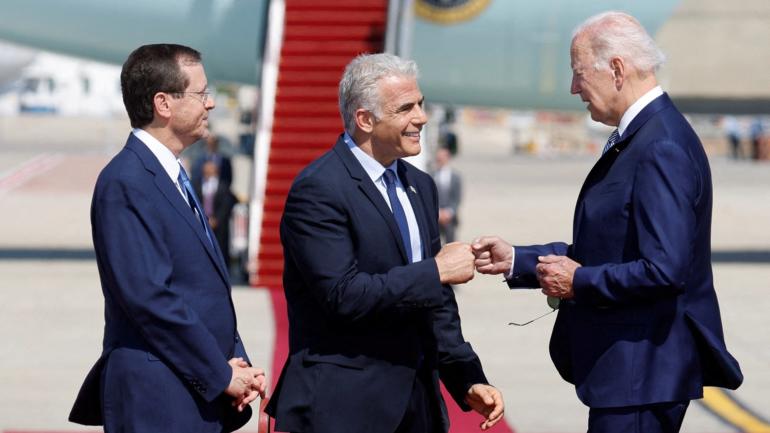In his first presidential visit to the Middle East, U.S. President Joe Biden reassured Israeli leaders of the U.S. commitment to Israel’s security.On Thursday, the U.S. President and Israel’s Prime Minister Yair Lapid signed a declaration to stop Iran from developing a nuclear weapon. Both leaders agreed nuclear deterrence is critical, but their paths of prevention are very different.
We begin with this report from CGTN’s Stephanie Freid in Tel Aviv.
Follow Stephanie Freid on Twitter @SFreid
Joining the discussion:
- Yossi Mekelberg is an Associated Fellow with the Middle East and Africa Programme at Chatham House.
- Dov Waxman is the Director of the Y &S Nazarian Center for Israel Studies at UCLA.
- Omar Baddar is a Palestinian-American Political Analyst.
- Trita Parsi is the Executive Vice President of the Quincy Institute for Responsible Statecraft.
For more:
The U.S. and Israel signed a joint anti-Iran nuclear declaration on the second day of Biden’s trip to the Middle East. (via @AJEnglish) https://t.co/e9Tu32sBqF
— Apple News (@AppleNews) July 14, 2022
President Joe Biden is visiting Israel for the first time since taking office, kicking off a whirlwind four-day trip to the Middle East in which he will hold talks with Israeli, Palestinian and Saudi Arabian officials. https://t.co/mVoPQGgzpJ pic.twitter.com/dZjI6VIYxk
— The Associated Press (@AP) July 13, 2022
As Biden prepares to go Saudi and Israel for a variety of reasons – none of which appear to be thoughtful – I am re-upping my piece from last month about how this trip signals that Biden is continuing Trump rather than Obama's legacy in the Middle East… https://t.co/dzmUHWu7ii
— Trita Parsi (@tparsi) July 13, 2022
 CGTN America
CGTN America

